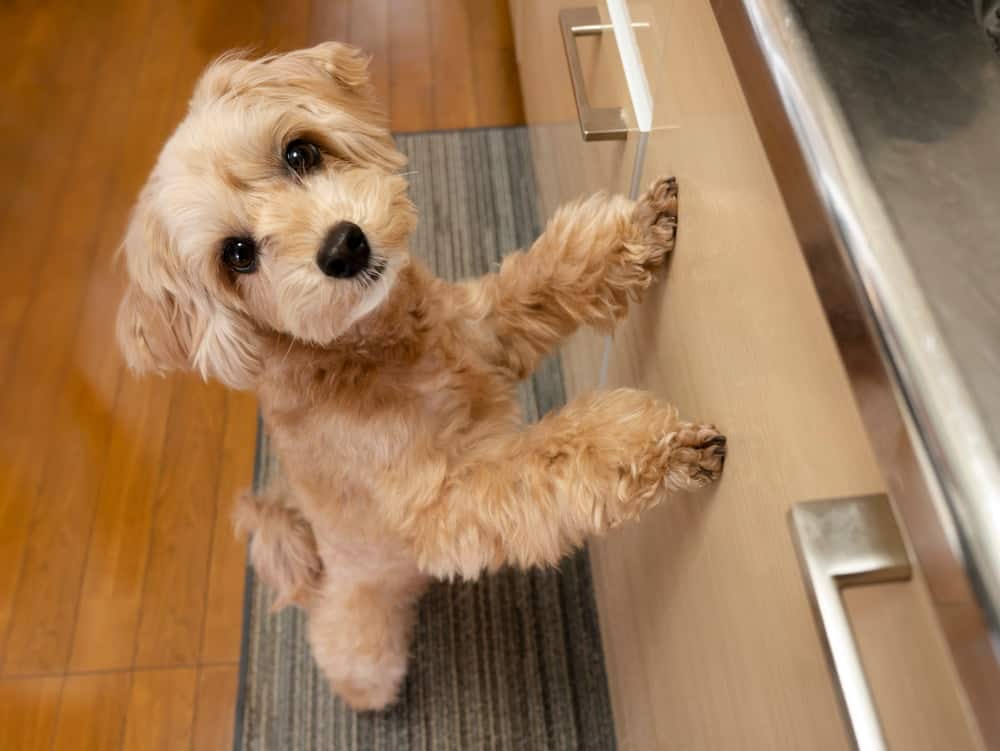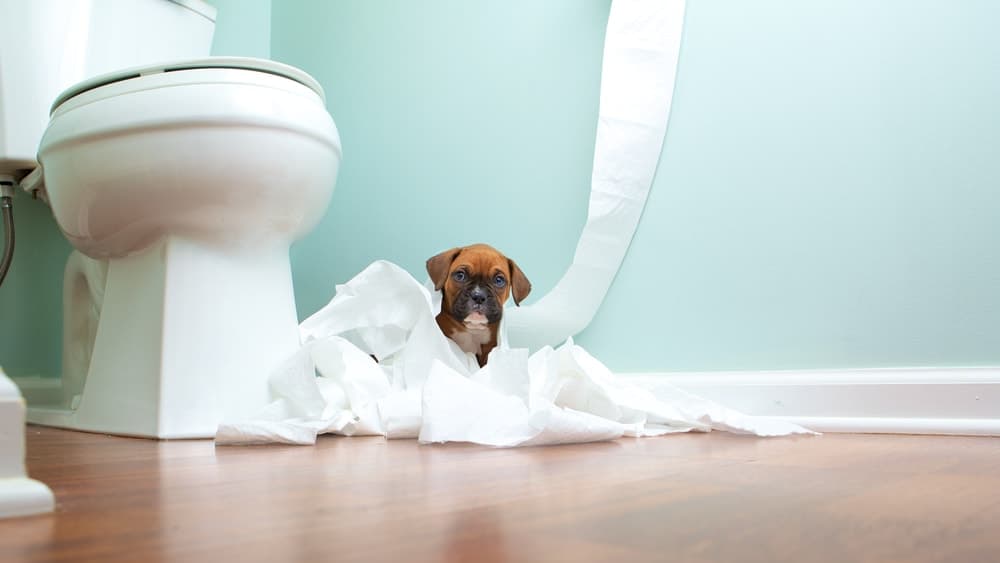“This post contains affiliate links, and I will be compensated if you make a purchase after clicking on my links.”
When it comes to pet safety, prevention is key. Because dogs can be curious, tend to put anything that will fit into their mouths, and will manage to get themselves into trouble if given the opportunity, taking steps to pet-proof your home are absolutely essential.
In this guide, we’ll go room-by-room to highlight potential sources of danger and the easy and effective ways to keep your dogs safe in any room of the house (and the backyard, too!)

The Kitchen:
• Always keep food, especially those that are toxic to dogs, off of kitchen counters where they can be reached by counter-surfing canines.
• When cooking on the stovetop, either use rear burners only, or, keep dogs safely away from hot burners either in a crate or behind a baby gate.
• Keep sharp knives, twist ties, plastic bags, batteries, cellophane, aluminum foil, and other small objects off of countertops and safely tucked within drawers or cabinets.
• Use cabinet and drawer latches, especially on under-sink cabinets where cleaning products are stored.
• Use a trash can with a dog-proof lid to keep curious pups from both making a mess and from ingesting potentially dangerous garbage, food wrappers, and bones.
The Bathroom:
• Always keep sinks and bathtub drains in good working order as standing water can be a drowning hazard, especially for our smaller furry friends.
• Keep countertops clear of bathroom items that can be dangerous like dental floss, toothpaste, cleaning supplies, and medications.
• Use a covered trash can or keep the can under the vanity cabinet and use child safety latch to prevent access.
• Keep dirty laundry (especially socks and underwear that are small enough to be swallowed) safely put away in a clothes hamper or in a laundry room that’s inaccessible to your dog.
• Make a habit of always keeping the toilet seat closed when not in use, especially if you use toilet bowl cleaning tablets or harsh chemicals that can poison a thirsty dog.

The Living Room:
• Make certain that the television, entertainment center, and other large pieces of furniture are properly anchored and secure so that they pose no risk of falling if bumped into.
• Keep electrical cords safely hidden and inaccessible behind furniture or under rugs or use a cord protector to keep them safely out of your dog’s mouth.
• Eliminate risk of electric shock by using outlet covers on all exposed outlets.
• If you have a fireplace, always keep a fireplace screen in place, even when not in use.
• Make sure any potted houseplants in the home are not toxic. Many popular plants are dangerous for pets, even if they’re not ingested. Be sure to check out this guide to Common Plants That Are Toxic to Dogs for more information.
The Bedroom:
• Keep nightstands or bedside tables clear of small objects, coins, hair elastics, and medications that can pose a choking hazard or poisoning risk.
• Keep jewelry safely stored in a jewelry box or drawer.
• Keep shoes put away in a closet or an an over-the-door shoe rack. There’s just something about our shoes that dogs often find simply irresistible!
The Backyard:
• Make sure pets are always properly restrained, either on leash or behind a secure fence while outdoors.
• Make sure all plants and flowers in your yard and garden are non-toxic, even if your dog doesn’t chew on plants, many only require exposure to skin or accidentally being stepped on to cause a severe reaction.
• Only use pet-safe fertilizers, weed killers, and pesticides in areas of the yard that are accessible to your dog.
• Eliminate standing water such as in ponds or puddles as non-moving, non-filtered water can quickly develop dangerous bacteria, become a breeding ground for mosquitoes and the diseases they carry, or can become drowning risk.
• Make sure your dog always has access to fresh, cool water, but, avoid using stainless steel bowls as these can quickly heat in the sun and become a burn risk. Opt, instead, for plastic or ceramic bowls outdoors.
• Pick up sticks, fallen branches, and yard debris that can become choking or impalement hazards.
• If your home has a balcony or porch with a railing, make sure your dog’s head can’t fit through the slats either allowing him to escape and fall or enabling him to become stuck. Chicken wire fencing can be used to prevent dogs from trying to climb through balcony or porch slats.
Remember, dogs (and especially puppies) are very much like children in their curiosity and fearlessness. Until they are taught to appropriate interact with their surroundings, preventing accidents and injuries using the tips above can, literally, be lifesaving.
Do you have any pet-proofing tips to add? Please, share them in a comment below!












